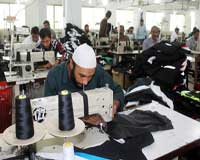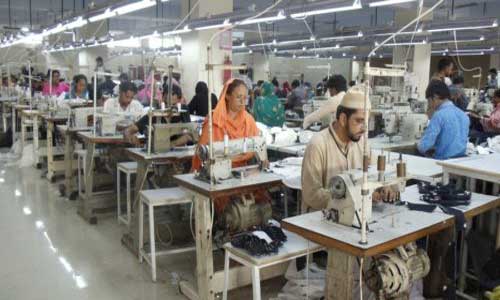"Pakistan's textile exports was worth $12.45 billion with imports worth $3.35 billion in 2016-17. The country exported raw cotton amounting to $42.85 million, cotton yarn $1.24 billion, cotton cloth $2.12 billion, cotton carded $235000, yarn other than cotton yarn $24.351 million, knitwear $2.362 billion, bed wear $2.133 billion, towels $786.606 million, canvas and tarpaulin $133.853 million, and readymade garments $2.316 billion in 2016-17, reported the recent textile division data."

Pakistan's textile exports was worth $12.45 billion with imports worth $3.35 billion in 2016-17. The country exported raw cotton amounting to $42.85 million, cotton yarn $1.24 billion, cotton cloth $2.12 billion, cotton carded $235000, yarn other than cotton yarn $24.351 million, knitwear $2.362 billion, bed wear $2.133 billion, towels $786.606 million, canvas and tarpaulin $133.853 million, and readymade garments $2.316 billion in 2016-17, reported the recent textile division data.

Pakistan has a cotton shortfall and that’s why it has to import about 2.5 million bales cotton for of $850 million per annum. The country also imports around 3-4 million synthetic fibre worth $500 million as it is not produced locally and other textile items worth $1.5 billion. Further the country imports synthetic and artificial silk worth $700 million and worn clothing of around $150 million. Besides this, to meet industry requirements, machinery worth $500 million is imported every year. Energy consumption by the textile sector is based on imported oil, coal and gas, which further adds to total production costs. Given this scenario, any depreciation of the rupee will increase costs of production manifold and may hurt the high value adding to textile exports.
Government thrust needed
As Ashfaq Hasan Khan, former economic adviser to Finance Ministry points out currency adjustment should be the last resort of the government as it would increase input costs of export-oriented sectors. Moreover dependency on imports has increased and depreciation would further hurt industrial sectors. The government should first review its taxation policy, reduce utilities tariffs including power, gas and water prices and immediately pay the stuck-up refunds of exporters to boost exports.
As per media reports, about 35 per cent production capacity of textile value chain is impaired/closed while prospective investors are reluctant to make new investments due to high cost of doing business. Energy cost is more than 30 per cent of the total conversion cost in spinning, weaving and processing industries. Industrial gas tariff in Pakistan is 100 per cent whereas electricity tariff is about 50 per cent higher than the regional competitors. Pakistan textile share in global market declined from 2.2 per cent to 1.7 per cent and unemployment increased by 30 per cent, sources added.
Exporters have raised serious concerns about declining exports and termed high cost of doing business including energy prices, non-payment of refunds claims as well as overvalued rupee as major factors making them uncompetitive. They further say 30-40 per cent factories have closed down while others are on the verge of collapse due to high input cost.
APTMA officials say electricity is available at Rs 10.5/kwh for the industry in Pakistan as compared to Rs 7/kwh in other regional countries including Bangladesh. Further, gas is available at Rs 1,000 /MMBTU in Pakistan against Rs 400 in Bangladesh. In such circumstances, the industry cannot compete in the international market and hence is losing customers, they added.
As Amir Fayaz, Chairman, APTMA explains around Rs 200 billion of the textile industry is stuck with government under sales tax, duty drawbacks etc., and is creating severe liquidity crunch for the industry. Serious liquidity crunch is negatively affecting production capacity, resulting in a steady decline in the country's exports. Lot many textile mills have been shut in the past one year, resulting in loss of jobs and which has further complicated the entire trade dynamics.












